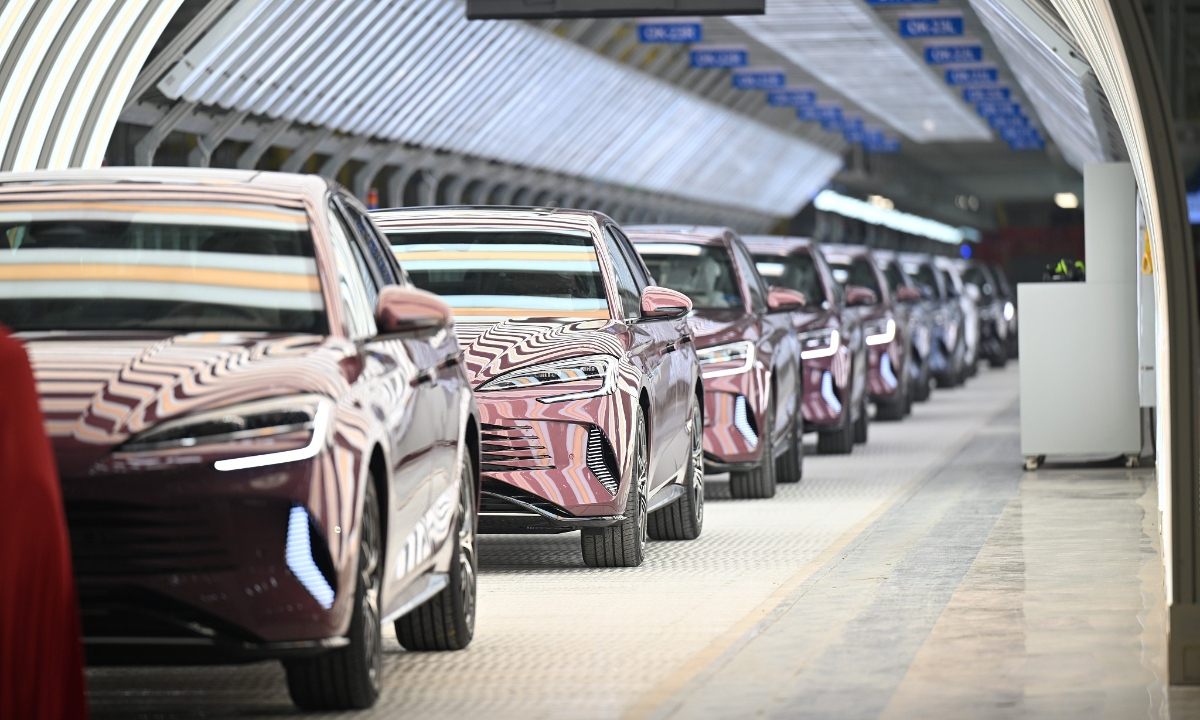
EV Photo:VCG
Chinese and European teams have reached "technical consensus" in recent electric vehicles (EVs) talks,
mk after in-depth discussions on the specifics of the price commitment plan on China-made EVs, Yuyuan Tantian, a social media account affiliated with state broadcaster CCTV, said in a post on Saturday.
The report came amid claims from some Western media that China and the EU have made very limited progress in negotiating price commitments as an alternative to tariffs, which makes the possibility of reaching an agreement slim. They even said it is China that has not brought up a plan that satisfies the European side.
However, such narratives were made intentionally to mislead public opinion and disrupt the negotiation process, Yuyuan Tantian wrote.
China and the EU have made progress in negotiations on a proposed price commitment plan concerning Chinese EVs, a Chinese commerce ministry spokesperson said last week.
Chinese and EU technical teams held five rounds of talks in Beijing from November 2 to 7, engaging in in-depth discussions on the specifics of the price commitment plan submitted by the China Chamber of Commerce for Import and Export of Machinery and Electronic Products, the spokesperson said.
According to Yuyuan Tantian, China and the EU have reached "technical consensus," especially on the price commitment framework and agreement implementation mechanism after the latest rounds of talks.
The "consensus on the price commitment framework" means that both parties in this round of negotiations have reached a certain consensus on the overall framework, suggesting that both parties are willing to focus their resources on negotiations of core interests and work toward the same goal, Yuyuan Tantian wrote.
Previously, the core issues involved in the talks were on “regulations’’ and “enforceability,’’ Yuyuan Tantian said, citing professionals.
During the talks, the European side harbored "unrealistic perfectionism" and always had doubts about the price commitment plan proposed by China, worrying whether it would be difficult to implement and supervise, according to the report.
Through this round of talks, China and the EU made some progress on this issue and reached consensus regarding the matter, it said.
Yuyuan Tantian revealed that if China and the EU reach a price commitment plan, the China Chamber of Commerce for Import and Export of Machinery and Electronic Products (CCCME) will play a core role in the implementation and supervision.
Those who deny the progress of the negotiations are not only trying to pour cold water on the talks, but also shift the responsibility to China with ulterior motives, claiming that China has not come up with a plan that satisfies the European side.
Negotiation is a matter for both parties. While, in the previous stage of negotiations, the reasons for the differences and difficulties were closely related to what the European side did, Yuyuan Tantian wrote.
Previously, the European side tried to negotiate with individual carmakers separately, insisting that it had such legal rights.
While, from the beginning of negotiations between China and the EU, China’s negotiator is always the Ministry of Commerce. The European side attempts to invite individual company to negotiate, aiming to defeat them one by one, and weaken the basis of negotiations for China. Such approach greatly undermines the trust China holds for the EU and is not conducive to solving the problem, Yuyuan Tantian wrote.
It is worth noting that it is EU that launched a countervailing investigation into the entire Chinese EV industry and decided to impose countervailing duties. The implementation of price commitments will also involve many complex links such as supervision and reviews. These systemic issues cannot be solved by the European side just by talking to a single company.
However, if mutual trust between the two sides is damaged due to negotiations with individual companies, the issues that the European side is concerned about will not be properly resolved, Yuyuan Tantian wrote.
At present, all authorized enterprises have unanimously agreed to participate as a whole in the price commitment negotiations by the CCCME. That is the most appropriate option under the current circumstances. It is conducive to maintaining mutual trust, accelerating the process of reaching consensus, and resolving differences through consultation to avoid escalation of trade frictions, Yuyuan Tantian wrote.
Global Times

